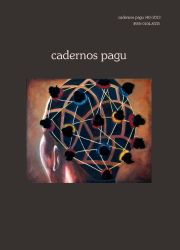Resumo
Na virada do século XIX, intelectuais afro-americanas assumiram a missão de construir uma nova face pública para sua raça. Com trajetórias excepcionais em relação à maioria da população negra, “mulheres da raça”, como Anna Cooper e Fannie Williams, deixaram escritos que apontavam o melhor caminho para preparar as “massas negras” para o mundo livre. Devido ao poder econômico, à formação intelectual e à luta antiracista, elas personificavam a imagem da “nova mulher negra”. O objetivo deste artigo é discutir quem era e o que se esperava dessa personagem, construída no pós-abolição dos EUA.
Abstract
At the turn of the twentieth century, African American intellectuals took on the mission of constructing a new public image for their people. Over the course of trajectories that were exceptional in comparison with the majority of the black population, “race women” such as Anna Cooper and Fannie Williams left writings indicating the best route to prepare the “black masses” for freedom. Due to their economic standing, their intellectual training and their struggle against racism, these women personified the “New Negro Woman.” My objective is to describe the image of this “New Negro Woman” as it was constructed in the postemancipation United States.
Key Words: “Race Woman”, “Female Talent”, “New Negro Woman”, Education, Post-emancipation, United States of America.
Referências
ANDREWS, William L.; FOSTER, Francis Smith; HARRIS, Trudier. The Concise Oxford Companion to African American Literature. New York, The Oxford University Press, 2001.
CARBY, Hazel. Reconstructing Womanhood: the Emergence of AfricanAmerican Women Novelist. New York, The Oxford University Press, 1987.
__________. White Woman Listen! Black Feminism and the Boundaries of Sisterhood. In: CARBY, Hazel. Cultures in Babylon: Black Britain and African America. New York, Verso, 1999, pp.63-92.
COLLINS, Patricia Hill Collins. The Black Feminist Thought: knowledge, consciousness, and the politics of empowerment. Routledge, New York and London, 2009 [2000].
DESANTIS, Alan D. Selling the American Dream Myth to Black Southerners: The Chicago Defender and the Great Migration of 1915- 1919. Western Journal of Communication (62) 4, Denver, University of Colorado, inverno de 1998, pp.474-511.
DRAKE, St. Clair; CAYTON, Horace. Black Metropolis: A Study of Negro Life in a Northern City. Chicago, University of Chicago Press, 1993 [1945].
GATES, Henry Louis. The Trope of a New Negro and the Reconstruction of the Image of the Black. Representations - Special Issue: America Reconstructed, 1840-1940 (24), California, University of California Press, outono de 1988, pp.129-155.
__________; JARRET, Gene Andrew. (eds.) The New Negro: Reads on Race, Representations and African American Culture, 1892-1938.
Princeton, Princeton University Press, 2007.
HIGGINBOTHAM, Evelyn Brooks. Righteous Discontent: The Women’s Movement in the Black Baptist Church, 1880-1920. Cambridge, Massachussets, Harvard University Press, 1993.
HINE, Darlene Clark. ‘We Specialize in the Wholy Impossible’: The Philantropic Work of Black Women”. In: MCCARTHY, Kathleen D.
Lady Bounfil Revisited: Women, Ohilanthropy, and Power. New Brunswick, Rutgers University Press, 1990, pp.70-93.
HOOKS, Bell. Talking Back: Thinking Feminist, Thinking Black. Boston, South End Press, 1989.
KNUPFER, Anne Meis. Toward a Tenderer Humanity and a Nobler Womanhood: African-American Women’s Clubs in Turn-of-theCentury Chicago. New York, New York University Press, 1996.
LEWIS, David Levering. When Harlem Was in Vogue. New York, Penguin Books, 1997 [1979].
LORDE, Audre. Sister Outsider: Essays and Speeches. New York, The Crossing Press, 1984.
MARKS, Carole. Farewell, We're Good and Gone. Bloomington, Indiana University Press, 1989.
PATTERSON, Martha H. The American New Women Revisited: a reader, 1894-1930. Rutgers, The State University, 2008.
RADFORD-HILL, Sheila Radford-Hill. Further To Fly: Black Women and the Politics of Empowerment. Minneapolis, University of Minnesota Press, 2000.
SALEM, Dorothy. To Better Our World: Black Women in Organized Reform, 1890-1920. Brooklyn, Carlson, 1990.
SCOTT, Emett. Negro Migration during the War. Oxford, Oxford University Press, 1920.
SHAW, Stephanie J. Black Club Women and the Creation of the National Association of Colored Women. Journal of Women’s History (3), Baltimore, The Johns Hopkins University Press, inverno de 1991, pp.10-25.
SMITH, Barbara. Home Girls: a Black Feminist Anthology. New Brunswick, New Jersey, London, Rutgers University Press, 2000 [1983].
TATE, Claudia. The Works of Katherine Davis Chapman Tillman, The Schomburg Library of Nineteenth-Century Black Women Writers.
New York, Oxford University Press, 1991.
TERBORG-PENN, Rosalyn. African-American Women in the Struggle for the Vote, 1850-1920. Bloomington, Indiana University Press, 1998.
URGO, Joseph R. Willa Cather’s Political Apprenticeship at McClure’s Magazine. In: SKAGGS, Merrill Maguire. (ed.) Willa Cather’s New York, New Essays on Cather in the City, Madison, Fairleigh Dickinson University Press, 2000.
WEISSBERG, Robert. The Politics of Empowerment. Westport, Praeger, 1999.
WHITE, Debora Gray. Introduction – A Telling History. In: WHITE, Debora. (ed.) Telling Histories: Black Women Histories in the Ivory Tower. The University of North Carolina Press, 2008, pp.1-25.
WILSON, Jan Doolittle. Disunity in Diversity: The Controversy over the Admission of Black Women to the General Federation of Women's Clubs, 1900–1902. Journal of Women's History (23), Baltimore, Johns Hopkins University Press, verão 2011, pp.39-63.
WOLCOTT, Victoria W. Remaking Respectability: African American Women in Interwar Detroit. The University of North Carolina Press, 2001.
YEE, Shirley. Black Women Abolitionists: A Study in Activism, 1828- 1860. Knoxville, University of Tennessee Press, 1992.

